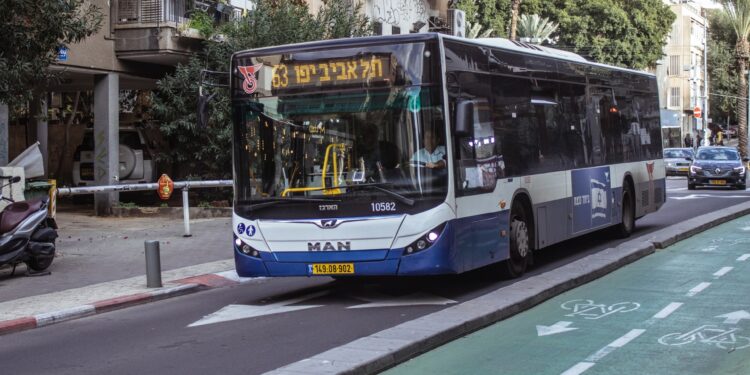The financial pressures on Israel as a result of its ongoing war on the Gaza Strip led to raising the prices of public transportation services starting next July by 5% for monthly subscriptions, and from 5.5 shekels ($1.48) to 6 shekels ($1.61) for a trip via individual buses. Light trains will rise to 8 shekels ($2.15), according to what the Israeli economic newspaper Globes reported.
Israel has curbed fuel prices for several months by reducing the tax on it, and the Transportation Ministry stated that Transportation Minister Miri Regev will discuss the matter with Finance Minister Bezalel Smotrich, according to the newspaper, but it appears that their ministries do not have budget resources to support the fare increase as a result of the pressures of the war on Gaza and military expenditures. Continuous.
The public transport fare is linked to the prices of inputs, fuel, wages and insurance, and prices are reviewed once a year in Israel in July, by a committee composed of representatives of the Ministry of Finance and the Ministry of Transport.
Reduce expenses
Israel is seeking to reduce its expenditures with the rise in military expenditures as a result of the continuation of the war on Gaza, with the possibility of opening a new front against Hezbollah, as the Ministry of Finance in Israel put forward a proposal that includes a comprehensive reduction in ministries’ expenditures in next year’s budget by 5%, amounting to 3.5 billion shekels (940.2 million). dollar).
This is one of several measures proposed by the Ministry’s Budget Department, which aims to reduce the expected fiscal deficit for next year by about 3.8% of the gross domestic product.
The Budgets Department of the Ministry of Finance prepared a list of possible amendments with a total value of up to 50 billion shekels ($13.43 billion), according to what Globes quoted from a source in the Ministry of Finance.
Among other proposals presented:
- Reducing the salaries of senior managers in the public sector.
- Postponing the next batch of pay increases in the civil service.
- Reducing allocations to the coalition parties (the parties forming the government) by between 2 and 4 billion shekels ($534.2 million and $1 billion).
- Abolition of unnecessary ministries.
- Raising the value-added tax rate to 19% (it is scheduled to be raised from the current 17% to 18%).
However, the sources suggested that this step would remain a precaution in the event that the confrontations in the north with Hezbollah develop into a comprehensive war, which requires immediate sources of funding.



